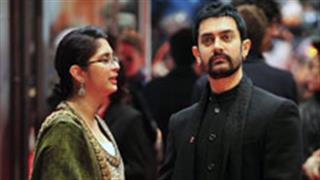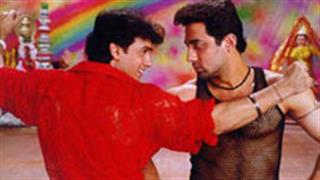With Indian cinema celebrating a hundred years it makes sense to wonder about the so-called 'global reach' of Bollywood, the giant Mumbai-based film industry that has virtually come to be equated with, however mistakenly, the entire range of cinema in India, especially for filmgoers overseas.
Personally, while studying Media Studies in London, I have had an opportunity to interact with students from across the world with their varied interests ranging from films to branding.
Surprisingly, each time Bollywood was mentioned, except for a few who recognised it as representing popular culture in India, most seemed to know next to nothing about what is admittedly the biggest film industry in the world, making more films annually than Hollywood.
Hence the question arises, has Bollywood truly extended its reach beyond the national boundaries?
After all, the huge revenues the Hindi film industry draws from its overseas market is quoted proudly, Bollywood stars get mobbed by swooning fans and the umpteen award ceremonies are held with fanfare in cities around the globe.

But then, out of a vast number of students representing different cultures and nationalities, only a handful manages to recognise Amitabh Bachchan (his appearance with big shots like DiCaprio in Great Gatsby recently might have helped), and very nearly nobody has heard of, or has trouble remembering Bollywood's favourite 'King Khan'!?
An informal survey among the multicultural group of around 30 students from places as diverse as Nigeria, Italy, Greece, Malaysia, China, Thailand, Turkey, Russia, Norway and Germany was revealing.

It turned out that most of these students had at some point watched one or more Bollywood films, but only four of them actually managed to remember which. And while most acknowledged the popularity of Bollywood in and beyond India, very few of them were actually aware of any major star.
Out of those who were aware, Aishwarya Rai's was a name that was readily mentioned. Ilaria Pizzichemi from Milan came up with the names of Abhishek, whom she recognised as Ash's husband, and Amitabh Bachchan, who she knew was a name to be reckoned with.

Priyanka Chopra too had made it to Ilaria's list of Bollywood stars, because, besides being a recurrent name in the press due to her recent foray into music, `They were, quite extraordinarily, broadcasting Dostana on Italian TV.`
Shah Rukh Khan was, however, a name Ilaria had to look up (she remembered him in connection with My Name is Khan, primarily because she reads up on the film festivals).
Norwegian student Anette Therese Hanssen found it hard to come up with star names, and admitted knowing hardly anything about Bollywood except that it `is a 'cheesy' kind of Hollywood`. Sofia Konstantzou from Athens was however, appreciative enough to say, `I wouldn't call Bollywood 'cheesy.''

She enjoyed watching Rang de Basanti, and observed that Bollywood films usually combined in them a repertoire of different genres-romance, humour, action, mystery etc.
Alkistis Dim, also from Athens, has seen plenty of Hindi movies, but interestingly, she watches them for a good laugh! Merve Mustecaplioglu, from Istanbul, has seen a few films for she loves romances, but she finds them long and repetitive, and cannot come up with any star name.
Pia Terstappen from Germany had started watching a few Hindi films on television, given the Bollywood fan base seems to have established itself somewhat firmly in Germany, but had, admittedly, never got to the end. Like Merve, the films according to Pia, are `too long and always on the same topic, and creates an illusory world that isn't the real India`. She associates Bollywood with Shah Rukh Khan, that's about it.
So, what is it about Bollywood, and Khan, that so intrigues Germany, when much of the rest of the world seems blissfully unaware of both?

In Shah Rukh's own words at Yale University, `They (his fans in Germany) told me.....we have a button to drive a car, to make coffee...but... we didn't have a button to cry. Your films gave us that button`. Indeed this may not be far from the truth. Starlet Katarina, 42, lives in Dresden, Germany. She is a self-proclaimed fan of the king of romance. She enjoys his films for their romance and melodrama, and, `primarily because of the emotions, his movies are so popular`.
Former Senior Producer of HBO Asia, and author of Lights, Camera, Masala! Making Movies in Mumbai, Naman Ramachandran, currently consultant for the London Indian Film Festival, gives his nod to the burgeoning Bollywood fan base in the UK.
However, the vast majority of punters, according to Ramachandran, are of South Asian origin, or, interestingly, belong to the Malay, Arab or North African communities. Apart from this, the general masses, says Ramachandran, approach Bollywood with a touch of levity.
It would seem then that a major part of the enormous revenues collected by some of the highest grossing Bollywood movies in the UK makes its way to the box office from communities that are themselves part of a diaspora, South Asian or otherwise.

In 2012, Eros International of the UK distributed films like Dabangg 2 which collected some Pound 940, 814, Agneepath Pound 742, 583, and in 2013 the only big-budget release till date Yeh Jawani hai Deewani grossed a staggering Pound 1.1 million.
While Bhavna Mistry of Eros International holds the frequent ranking of Bollywood films in the Top Ten UK charts as a yardstick for the hype surrounding the films, blogger and media consultant Tirthankar Bandyopadhyay denies the existence of any such hype as far as the UK is concerned.
He hints at the presence of a niche market for the films in the country, and like Ramachandran, he believes that to be the consequence of a massive, and ever-growing Indian diaspora in the UK which lives off these films.

The `uncomplicated` entertainment value of the films, opines Bandyopadhyay, takes care of the rest, catapulting the films to a space of niche merry-making, not coveted much by mainstream audiences (meaning Western or European audiences) as by the vast migrant populations, largely led by South Asians.
The diaspora population's loyalty indeed accounts for the box office earnings and interest amongst people especially from parts of the European Union, seems minimal except, of course, Germany, where, by some quirk of fate, the Baadshah of Bollywood seems to hold sway.
Subsequently one can perhaps justifiably conclude that Bollywood's global appeal is, in fact, not so global after all, for much of its lifeblood abroad draws from its Indian or at least South Asian viewers.

Having said that, who can dispel the fact that from humble beginnings Bollywood today is a towering figure in the international scene? Perhaps, as in Germany, the Bollywood fever could spread further amongst non- Asians. After all, `...Picture....abhi baki hai mere dost!`




















